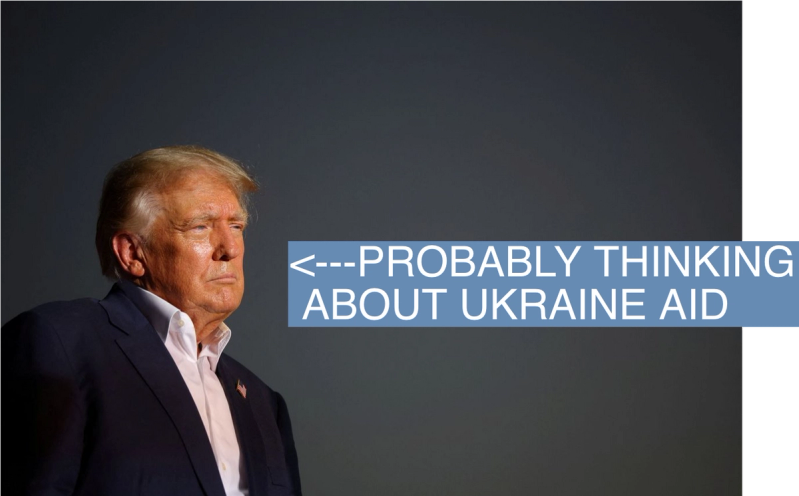The Scoop

There’s a battle underway to sway Donald Trump on the question of Ukraine aid, where Republicans are split between Reaganites who favor continued support and America Firsters who want to pull back and focus on the homefront.
The debate mirrors a broader GOP divide between more traditional hawks, who favor a robust American military and diplomatic role in foreign affairs, and more nationalist Republicans, who are skeptical of American involvement abroad.
The Reaganite crowd includes the likes of former Trump official Michael Caputo, who describes himself as an “ardent supporter of Ukraine” and has even introduced his Ukrainian family members to the former president. Caputo told Semafor that Trump knows his “feelings on the topic,” which he characterized as providing military aid, but without U.S. troops getting involved.
Caputo’s pro-Ukraine viewpoint is shared among a number of Republican lawmakers who remain close to Trump, like Sen. Lindsey Graham, R-.SC., who frequently appears on Fox News – which is often considered an indirect line to the former president himself – to rally conservatives towards his side.
In recent months, however, the America First crowd has grown louder in making their case. Rep. Matt Gaetz, R-Fla., who has consistently voted against Ukraine aid and told Semafor that he speaks “frequently” with Trump about related issues.
“I prefer American presidents to be ‘Peace through strength’ and not ‘Weakness through war,’” Gaetz said. He predicted that Trump would run in 2024 on putting “our country and our people first.”
Former Trump campaign advisor Steve Cortes has also been trying to persuade the former president that “there is no discernible US national interest at all in” the Ukraine-Russia battle and that “no good actor” exists. His sentiments echo that of Trump’s son, Don Jr., who tweeted earlier in October after Hurricane Ian that the U.S. should “get every single Floridian back into their homes and back to normal before we send one more cent to the Ukraine.”
“Not our problem, not our business,” Cortes told Semafor.
In this article:
Shelby’s view
Trump’s views on foreign policy have historically been flexible, which often creates high-stakes Apprentice-style battles between his backers, who run the gamut from superhawks like Graham to anti-interventionists like Sen. Rand Paul, R-Ky.
“He hears everyone out,” Caputo told Semfor. “And in the end takes his own counsel.”
The debate inside Trumpworld is also indicative of a larger one playing out within the GOP as a whole – and one that will only grow more significant should Republicans take control after the midterms.
Already, there’s keen focus on what the party will do after the midterms, with House Minority Leader Kevin McCarthy signaling this month that Americans are becoming more skeptical of giving aid to Ukraine as the country’s own economy looks shakier.
Trump, largely seen as the de-facto leader of the Republican party, still holds significant sway among lawmakers, who will be watching him closely. In recent weeks, he has called for an “immediate negotiation” between Russia and Ukraine.
At the same time, Trump has praised Russian President Vladimir Putin – a move that openly frustrated Republicans like Graham — while also criticizing the Biden administration for its handling of the war. Less clear, however, is what he would do if he were president, and how much, if any, aid he would have supported. He did criticize a $40 billion aid package in May and suggested the focus should instead be on the U.S. baby formula shortage
Room for Disagreement
Retired Lt. Gen. Keith Kellogg, an early Trump backer who served as Vice President Mike Pence’s national security adviser, thinks there’s a potential middle ground between the two camps. “America First does not mean America alone,” Kellogg told Semafor.
In Congress, a balanced approach might take the form of approving money for Ukraine, but with more oversight and guardrails, or with spending conditioned on increased support from other nations.
“All of these other countries are not really providing what they should be providing,” Kellogg said.
The View From Ukraine
Ukrainians are acutely aware of the divide on the American right ahead of the midterm elections, which they know could threaten the military support and sanctions that have put Russia’s military on its heels. Olena Tregub, secretary-general of anti-corruption watchdog NAKO, told Foreign Policy “there is a strong reaction [to] some statements of Donald Trump or Tucker Carlson” that some in Kyiv sees as echoing Russian propaganda.

